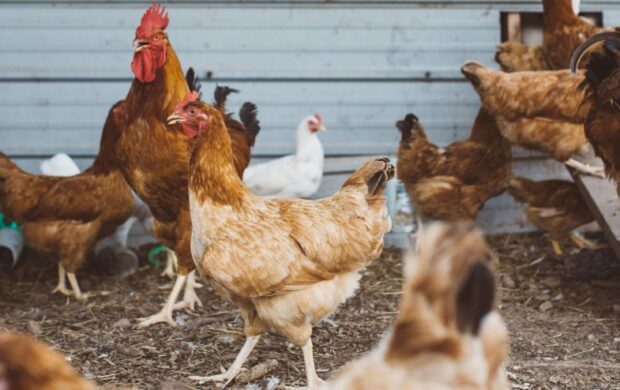Our Action Sprint is exploring the role of plant-based innovation in driving a just transition to sustainable, healthy diets in Europe and the US. What have we learnt about the shape of plant-based innovation“done well”?
In our second and final workshop, we focused on what kind of innovation we all need to be generating and supporting to ensure overall action is transformative and not just incremental.
We brought two “ingredients” to the workshop to do this. Firstly, three very different types of organisation – Hubbub, Nestle and EIT Food – shared how they currently “do” innovation, and their insights on the potential for innovation to contribute to a just transition. Secondly, we looked at examples of innovations (some of which are shared here) aligned with the areas we’d previously identified where plant-based innovation done well can help to catalyse positive change. From all this we tried to tease out the possible attributes of genuinely transformative innovation.

Together we identified the following considerations for approaches to plant-based innovation to help catalyse a just transition to better diets. To be more transformative, that innovation needs to:
- Address the challenges holistically, avoidingtrading off one aspect against another (eg human health vs the environment) or ignoring some issues altogether (eg living wages for food workers).
- Design/test for – and commit to – scaling up, at speed, because the challenges are urgent, and we need rapid positive change at scale. Scale can happen in different ways: it might mean many similar innovations or activities joining up more effectively, not just one innovation becoming “bigger”.
- Cater to more different individuals and communities and unmet needs. Successful innovations often leave people behind, who are considered too hard to reach, or are just less important or visible to those doing the innovating. For a just transition and equal access to good diets, innovation must cater to more parts of society and do more to address everyone’s unmet needs around healthy, sustainable eating.
- Look beyond the product level, considering how innovations sit within and affect the bigger picture of what’s needed. This includes:
- Creating genuinely equitable business models, whether from the ground up or by transforming what we already have (eg looking beyond the usual funders/investors to new partners with an interest in similar outcomes); and, especially important, ensuring food workers earn enough to afford good food.
- Changing eating behaviours for the better, and at scale, based on a solid understanding of where people are starting from.
- Driving and supporting mindset and cultural shifts, including within specific target groups – recognising and working with the fact that this could take time.
- Decentralise access to good food making it more available out of hours, out of town, or for isolated/less mobile consumers, and easier to grow some fresh produce at home or nearby.
- Empower people through food skills and knowledge, enabling them to grow food and cook more from scratch, understand more about what they’re eating, and help others to do the same (eg skills sharing between chefs).
This is not meant as a definitive, exhaustive list (or a completely novel one). Arguably the value lies in treating these considerations as an interconnected set to help ensure innovation is truly transformative, and/or in understanding which area we can be best at, while supporting others to act on the remaining areas (and certainly without undermining them). They can generate useful prompt questions/challenges: Does my approach to innovation truly live up to all of these considerations? Am I failing on any of them? Where might I be able to do more?
If the above describes what we need to aim for, then how do we move our innovation approaches in that direction?
The workshop participants also discussed some of the enablers for more transformative kinds of innovation:
- Breaking out of our“innovation bubbles” to develop better ideas more in line with what the world needs more open innovation processes (eg bringing together young entrepreneurs, academia and civil society as well as business); more inclusive innovation to drive equality in who participates (eg less-heard voices and less catered-to communities).
- Rethinking partnerships: to build in more ambition and make the best use of respective capabilities – working with those who can take our innovations to scale in different ways, help us share knowledge and information more effectively, distribute our products/services, or help make them more affordable…
- “Matchmaking” to drive impact, including innovating where it’s needed the most, or supporting those who already offer a solution to my problem (rather than competing or reinventing).
- More collective voice and co-ordination across existing smaller-scale innovators, such as community-based initiatives and entrepreneurs (often overstretched and underfunded) to share skills and resources, and demonstrate collective impact and value. Perhaps starting with a national union of community initiatives?
- Combining the best of the past and the present to go faster: drawing on existing/traditional foods, recipes, cooking techniques and knowledge together with today’s science, technologies and insights, to reach positive impact faster and without reinventing the wheel.
- Supporting some innovations as bridges to a better place if not our ultimate, ideal solution (eg recipe kits as a stepping stone towards more scratch cooking).
- Advocating for policies, subsidies, regulation etc that recognise the connections between health, nutrition, food and the environment.
Finally our participants shared some reflections, personal actions, and questions to explore further:
- Tipping current innovations towards their transformative potential: for example, meat alternatives have the potential to keep people eating badly, or to help drive a mainstream shift to more plant-based, healthier diets. How can we influence this? Whose responsibility is it?
- Embedding innovation into strategies for greater food equity: The food industry has a big opportunity to improve many people’s ability to afford good food, by ensuring all its own workers earn living incomes.It’s difficult for any affordable innovation strategy to be credible if the organisation doesn’t pay living wages. Who’s doing this well and supporting this message, and what can be learnt or replicated from that?
- Ensuring a collaborative“ecosystem” of innovators: Whose responsibility is it to lead the transformation we need? How do we best combine top-down and bottom-up approaches? How can innovators, with different audiences, areas of expertise, scales, perspectives and visions, work alongside one another, and support one another to all move towards more transformative action? Who or what can facilitate this?
“I want to take my local community project to a much bigger scale, not just because I want to, but because the world needs it.”
“I’m going to work on my business partnerships to ensure they’re more true, more genuine, with more commitment to scaling up the findings of our pilots from the start.”
What insights would you share around designing, delivering or supporting genuinely transformative innovation for a just transition to more healthy and sustainable diets? What could you do differently to reshape your approach to innovation to that end, and who could help you? Who’s helping to create the right conditions for transformative innovation for a just transition?
Join the conversation and share your thoughts here.
Our Action Sprint brought valuable and cutting-edge insights from actors across the food system, which have been fed into the UN Food System dialogues. To read the full report, visit our dialogue web page.

















Join discussion